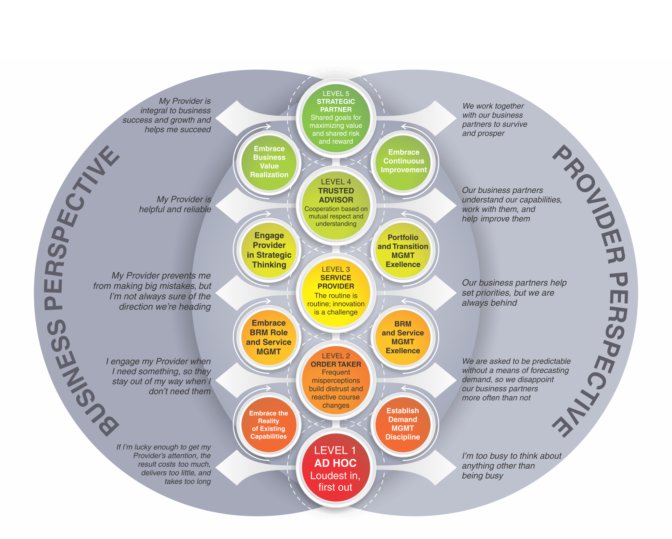Business Relationship Manager: What’s in a Name?

While some say job titles are unimportant and irrelevant, others suggest that titles speak to one’s level of knowledge, expertise, and professional success. Regardless of your opinion, however, it’s undeniable that job titles often express an individual’s level of seniority and area of focus.
According to Fast Company, Pearl Meyer & Partners (a compensation consultancy based in New York City) published a 2014 study that stated that “80% of companies surveyed use job titles to accurately reflect the corporate hierarchy and more than 92% use them to define an employee’s role.”
In other words, job titles broadcast the answers to important questions: who you are, what you do, and the level at which you operate in your company. Job titles can be a source of empowerment to provide license for individuals to do their jobs effectively.
The title of “business relationship manager” (or BRM) is one that is frequently misunderstood. In the world of IT, BRMs are often understood to be the person who cultivates a strong relationship with internal business partners and serves as a trusted technology advisor to the benefit of both parties.
However, if you look at this title through the eyes of people outside of IT, not only can it be quite ambiguous, but it can cause confusion about the BRM’s role (despite the best efforts of introductions, emails, and other communications), unintentionally undervalue its purpose, and affect the ability of the BRM to succeed.
The BRM…should be presented and marketed as what it is: a strategic, high-level, business-focused partner who helps business functions optimize their technology investments and use them in a way that helps advance business goals and strategy.
Now, if one believes titles are unimportant, the argument might be that a good BRM will establish themself based on the job they do and how they present themselves, which may be true in some cases. However, in those cases they will do so despite the ambiguity of the title – it will not have helped them in their journey.
The lack of clarity surrounding BRM job titles across different industries serves no positive purpose, and the BRM is such an important role that it should be presented and marketed as what it is: a strategic, high-level, business-focused partner who helps business functions optimize their technology investments and use them in a way that helps advance business goals and strategy.
The BRM function is so critical in this day and age of technological ubiquity that it must be assigned job titles that clearly spell out its value, both inside and outside of IT.
So how should companies develop an appropriate title for the BRM role?
Here are some suggestions:
- Be descriptive. The title should send a message about who the person is, the role they play within the company, and the value they offer the business as a whole.
- Think about corporate hierarchy. Since this role will involve strategic partnership with senior-level executives within the company, the job title should reflect that tier of engagement.
- Consider your audience. Avoid acronyms and technical terms that mean little to audiences outside of IT.
- Fit to size. Consider corporate culture, organizational modeling, politics, and other factors to ensure a comfortable fit within your particular organization. Job titles are not usually “one size fits all.”
- Think like a marketer. The BRM’s job title can say a lot about how IT markets itself within the company.
Examples like “Strategic Business Partner,” “Senior Technology Advisor,” “Business Technology Lead,” and “IT Executive Partner” are all job titles that accurately reflect the value and work of the BRM function, in addition to making it easier for companies to move up the BRM Maturity Model.
BRM Maturity Model
Image source: Business Relationship Management Institute
Each company should decide the job title that works best for their particular organization and industry, but by creating a strong, descriptive, and value-oriented title, you not only send a valuable message to your business partners—you also let the people within these roles know they should feel empowered and emboldened as valued members of the company.
The next time your BRM walks into a meeting and announces, “Hi, I am from corporate IT and I serve as your strategic business partner” during introductions, rest assured the people in that meeting will know why they are there.
Jeff Warren is the president and founder of the Barkley Consulting Group. He has over 30 years of experience as a global technology executive and has held a variety of IT leadership roles around strategy development, business relationship management, innovation, retail, and business intelligence. Jeff has been instrumental in building BRM organizations in Fortune 500 companies and developing sound strategies to ensure lasting success.
Jeff holds a Bachelor’s Degree in Computer Science from Hofstra University and a Certificate of Professional Development from Wharton School of Management, University of Pennsylvania. He is a guest lecturer and speaker and works in an advisory capacity for start-ups in the technology sector. In addition to his consulting practice, Jeff also serves as the program director for Design Thinking at Stony Brook University.


Great article!!!!
Thank you for this article! It helped me not only explain the role, but explain the risks of not marketing it appropriately for our Organization’s maturity level.
Hi Ashley! That’s fabulous! We’re glad that you found value out of this article. Keep up the great work!
[…] you know that about 80% of companies use job titles to reflect the brand’s hierarchy? Besides, about 95% use them to outline each […]
[…] you know that about 80% of companies use job titles to reflect the brand’s hierarchy? Besides, about 95% use them to outline each […]
[…] you know that about 80% of companies use job titles to reflect the brand’s hierarchy? Besides, about 95% use them to outline each […]
[…] you know that about 80% of companies use job titles to reflect the brand’s hierarchy? Besides, about 95% use them to outline each […]
[…] you know that about 80% of companies use job titles to reflect the brand’s hierarchy? Besides, about 95% use them to outline each […]